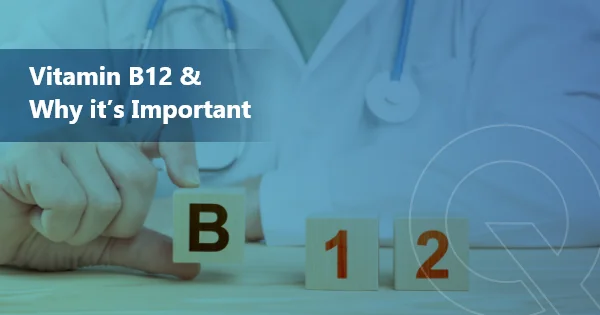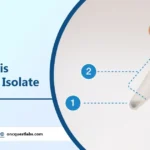Contents
Overview
Vitamin B12, or cobalamin, is a water-soluble vitamin that helps the brain and nervous system work properly. It was the last of the currently known vitamins discovered in 1926, but that doesn’t make it less important for human health. Also called the “red vitamin” because of its colour, B12 helps maintain healthy neural and mental function.
Vitamin B-12 plays an essential role in:
- red blood cell formation,
- cell metabolism,
- nerve function and
- the production of DNA
Vitamin B 12 plays a vital role in pregnancy as it can help to prevent spinal and central nervous system congenital disabilities in the baby.
Like most vitamins, your body cannot make B12. Instead, you need to take it through food or supplements.
Vitamin B12 and Folic Acid
Folic acid, also called folate, is another B vitamin. Folic Acid and Vitamin B12 work closely as team players to form an integral part of our metabolism. These two B vitamins are also crucial for a healthy functioning nervous system.
What happens if there is a deficiency of B12?
Symptoms of Vitamin B12 deficiency vary from individual to individual. There are an array of symptoms a vitamin B12 deficiency can cause. These conditions are sometimes overlooked with something else.
Vitamin B12 deficiency symptoms may include:
- strange sensations, numbness, or tingling in the hands, legs, or feet
- difficulty walking (staggering, balance problems)
- anaemia
- a swollen, inflamed tongue
- difficulty thinking and reasoning (cognitive difficulties), or memory loss
- weakness
- fatigue
The doctor may notice the symptoms and recommend a blood test to confirm the condition. Early detection and treatment are essential. If left untreated, the deficiency can cause severe neurologic problems and blood diseases.
What leads to B12 deficiency?
Shortage of the vitamins needed to produce enough healthy red blood cells leads to vitamin deficiency anaemia.
It can also develop if your diet lacks specific vitamins or because your body can’t properly absorb the nutrients you eat.
Causes of vitamin deficiency anaemias include:
Folate deficiency anaemia
A diet consistently lacking in folate, also known as vitamin B-9, a nutrient found mainly in fruits and leafy green vegetables, can lead to a deficiency.
If your body is unable to absorb folate from food and supplements for reasons such as:
- You have a disease of the small intestine, such as celiac disease
- You’ve had a large part of the small intestine surgically removed or bypassed
- You drink excessive amounts of alcohol
- You take certain prescription drugs, such as some anti-seizure medications
There is an increased demand for folate in some cases, such as pregnant women, breastfeeding women, and people undergoing dialysis for kidney disease. Failure to meet this increased demand can result in a deficiency.
Vitamin B-12 deficiency anaemia
If you take a diet lacking in Vitamin B-12, mainly in meat, eggs and milk, you may develop Vitamin B12 deficiency anaemia.
One of the most common causes of Vitamin B-12 deficiency is the lack of a substance called intrinsic factor. This is caused when your immune system mistakenly attacks the stomach cells that produce this substance. This type of anaemia is called pernicious anaemia.
Intrinsic factor helps join vitamin B-12 in the stomach and move it through the small intestine to absorb your bloodstream. Without intrinsic factor, vitamin B-12 can’t be absorbed and leaves your body as waste.
Your small intestine can’t absorb vitamin B-12 for many reasons other than a lack of intrinsic factor. These reasons include:
- You’ve had surgery to your stomach or small intestine, such as gastric bypass surgery.
- You have abnormal bacterial growth in your small intestine.
- You have an intestinal disease, such as Crohn’s disease or celiac disease, that interferes with absorption of the vitamin.
- You’ve ingested a tapeworm from eating contaminated fish. The tapeworm saps nutrients from your body.
Who should watch their B12 levels?
Many factors can affect your body’s vitamin stores. You may have an increased risk of vitamin deficiency if:
- Your diet contains no natural vitamin food sources, such as meat, dairy, fruits and vegetables. Vegetarians who don’t eat dairy products and vegans, who don’t eat any foods from animals, may fall into this category.
- You’re pregnant, and you aren’t taking a multivitamin. Folic acid supplements are essential during pregnancy.
- You have intestinal problems or other medical conditions that interfere with the absorption of vitamins.
- You consume alcohol in excess: Alcohol interferes with the absorption of folate and vitamin C, and other vitamins.
- You have endocrine-related autoimmune disorders, such as diabetes or thyroid disease.
- You take certain prescription medications that can block the absorption of vitamins. Anti-seizure drugs can block the absorption of folate. Antacids and some medicines used to treat type 2 diabetes may interfere with B-12 absorption.
When to see a doctor?
If you’re experiencing vitamin B12 or folate deficiency anaemia symptoms, please see a doctor. These conditions can often be diagnosed based on your symptoms and the results of a blood test.
As always, it’s essential to be diagnosed and treated as soon as possible.
Following laboratory tests may be ordered to confirm the diagnosis:
- Standard blood tests to measure the level of red blood cells and their appearance. In Vitamin B12 deficiency, red blood cells are huge and appear abnormal.
- Blood tests to measure levels of iron and folate to check for deficiencies.
- Blood test to measure methylmalonic acid level. The blood level of methylmalonic acid increases when a person has Vitamin B12 deficiency.
- Blood tests for intrinsic factor antibodies. Most people who lack intrinsic factors in their stomachs have these antibodies in their blood.
Boosting your B12
Your doctor will determine the best treatment for you based on your age, overall health and medical history, the extent of deficiency, how well you handle certain medications and your preferences.
Treatment may include vitamin B12 shots (injections) and folic acid pills.
Foods that are rich in folic acid include the following:
- Oranges
- Eggs
- Meat
- Poultry
- Milk
- Shellfish
- Fortified cereals
What are the complications of vitamin B12 deficiency?
Vitamin B12 deficiency or folate deficiency can be easily and effectively treated; complications are rare. A complication can develop if you have been deficient in either vitamin for some time.
Anaemia complications: can lead to heart and lung complications as the heart struggles to pump oxygen to the vital organs. Adults with severe anaemia are at risk of developing:
an abnormally fast heartbeat (tachycardia) heart failure, where the heart fails to pump enough blood around the body at the correct pressure.
Neurological changes
A lack of vitamin B12 can cause neurological problems, which affect your nervous system, such as:
- vision problems
- memory loss
- pins and needles (paraesthesia)
- loss of physical coordination (ataxia), which can affect your whole body and cause difficulty speaking or walking
- damage to parts of the nervous system (peripheral neuropathy), particularly in the legs
Infertility
Vitamin B12 deficiency can sometimes lead to temporary infertility.
Stomach cancer
You are at an increased risk of developing stomach cancer due to a vitamin B12 deficiency caused by pernicious anaemia.
Neural tube defects
If you’re pregnant, not having enough vitamin B12 can increase the risk of your baby developing a severe congenital disability known as a neural tube defect.
Disclaimer:
This blog is for informational purposes only and should not be construed as advice or as a substitute for consulting a physician. It is not a substitute for medical advice or treatment from a healthcare professional.
Sources:





